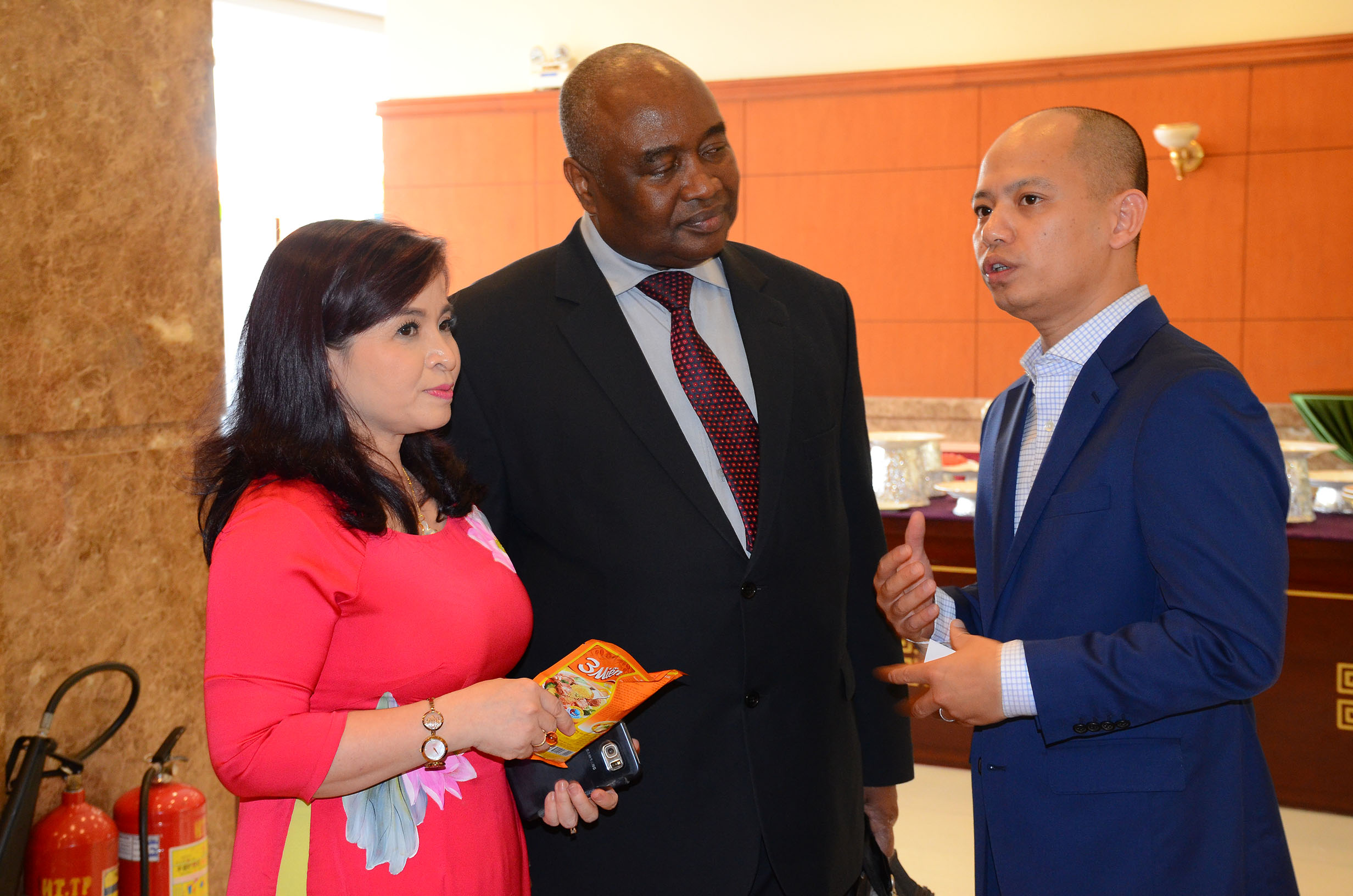In the alarming situation of iodine insufficiency in Vietnam, UNIBEN Company has actively collaborated with experts from the Nutrition Center of Ho Chi Minh City for researching and developing a new food product – iodized bouillon, which is currently highly recognized by nutritional practitioners.
In order to facilitate healthy eating habits among the population, UNIBEN has also distributed a significant amount of the iodized bouillon to millions of Vietnamese families.
Vital needs of iodine
According to physician nutrition specialist (PNS) Do Thi Ngoc Diep, director of Nutrition Center of Ho Chi Minh City, iodine plays a key role in the proper functioning of the thyroid gland, and the lack of it causes several deceases related to physical and mental retardation, commonly known as Iodine Deficiency Disorders (IDD).
Recommended Dietary Allowances (RDAs), the World Health Organization (WHO), the United Nations Children’s Fund (UNICEF), and the International Council for the Control of Iodine Deficiency Disorders (ICCIDD) also point out that iodine is essential for all ages, especially for pregnant women and children.
The recommended daily iodine intake is 110–120 mcg/day for children, 150 mcg/day for most adults, and 220–250 mcg/day for pregnant women [1].

Despite the high importance, iodine cannot be produced by the body itself but relying on daily food consumption.
Iodine deficiency in Vietnam
Less than a decade after Vietnam stopped the successful National IDD Control program 1993-2005 and downgraded IDD control from a national health priority to routine activities in the public health sector, many nutritional experts currently do warn of a comeback of iodine shortages in the country [2, 3].
In particular, the element supply in local plants and crops is diminishing due to severe floods that washed it out of the ground.
A WHO survey in 2015 says, “only 23/90 communes having minimum iodized salt coverage of 90 percent, 77.7 percent of pregnant women are iodine deficient, in which 44.6 percent of them are from moderate to severe iodine deficient” [4].
Meanwhile, some national programs such as Government Decree No. 09/2016/ND-CP to boost iodine for health emphasized that salty spices as well as some other food products must be enriched with iodine [5].
Nevertheless, many food manufacturers disagree with the Decree due to a number of potential problems such as: a) incremental costs and disruption to stable production processes, as well as b) the change of regular taste, color, and expiration dates of food after adding highly oxidizable iodine [6, 7].
In this situation, UNIBEN is the pioneer Vietnamese enterprise, which made a considerable investment into R&D for creating iodized food products.
Iodized bouillon as a result of science-enterprise collaboration
One of the reasons for the iodine deficiency is that Vietnamese people currently use a lot of salted spices other than table salt to prepare foods such as seasoning granules, which are not iodized.
Accordingly, UNIBEN together with nutrition scientists from the Nutrition Center of Ho Chi Minh City have come up with a simple but revolutionary idea: adding iodine to daily seasonings such as bouillon.
Months of analyzing physical and chemical elements, carrying out several tests on iodine supplementation in UNIBEN's factory seems to be working as it has given birth to the formula and a manufacturing process for the new UNIBEN product line called “3 Mien Iodized Bouillon” [8].
A cross-sectional experiment identified that a median iodine intake from “3 Mien Iodized Bouillon” is increasing from 264 ± 126 mcg/day, much higher than the non-iodine supplementation, which is 95.6 ± 50.1 mcg/day.
In addition, “3 Mien Iodized Bouillon” will impart an aromatic "gamey" and savory flavor to both full and meatless dishes.
The “3 Mien Iodized Bouillon” is recommended by doctors and nutritionists as a simple and economical solution to ensure that Vietnamese families have sufficient intake of Iodine.
![Mrs. Diep Do (L), Director of Nutrition Centre of HCM City, introduced “3 Mien iodized Bouillon” in a conference to promote a healthy lifestyle (HCMC, Oct 26th 2016) [Photo courtesy of UNIBEN]](http://static.tuoitrenews.vn/ttnew/r/2017/11/27/bs-diep-va-hat-nem-3-mien-1511745229.jpg) |
| Diep Do (L), director of the Nutrition Center of Ho Chi Minh City, introduces “3 Mien Iodized Bouillon” in a conference to promote a healthy lifestyle in Ho Chi Minh City, October 26, 2016. Photo: UNIBEN |
UNIBEN and its corporate social responsibility
UNIBEN devoted a significant amount of resources to promoting healthy eating habits and greater awareness of the new way of iodine fortification among the population. The organization supported the Nutrition Center of Ho Chi Minh City to spread out millions of handbooks on nutrition that educate people on the importance of iodine intake and how to do it efficiently.
Most importantly, UNIBEN has given away thousands of tons of Iodized Bouillon to millions of Vietnamese families, so that they can become familiar with using “Iodized Bouillon," through UNIBEN's nationwide distribution system and its consumers base. In particular, since March 2016, the organization has distributed more than nine million 200g/400g packs of “3 Mien Iodized Bouillon” at a total cost of more than VND120 billion (around US$5.4 million).
These free packs mainly came to consumers as freebies included in “3 Mien” instant noodle boxes. The outcome of this initiative is tremendous: after one year, an estimated six to nine million households have been trained to use “Iodized Bouillon” in cooking.
This protects more than 35 million Vietnamese against the risk of mental retardation caused by iodine deficiency.
Asked about the company's strategy, Dr. Dung Vu, CEO of UNIBEN Company, explains, “UNIBEN always considers the care of the community's health as our main corporate social responsibility.
“We spend a lot of R&D efforts to ensure that our foods are both tasty and safe. Moreover, we aim to create as many new healthy and affordable food products as possible for every Vietnamese family.
“The community-oriented program ‘3 Mien Iodized Bouillon’ with its unique product for the Vietnamese market is just the beginning of our journey in this direction.”
![With the iodized “3 Mien Bouillon”, UNIBEN has been recognized nationally with Nutrition Food Award in Nutrition Conference held in August 2017. [Photo courtesy of UNIBEN]](http://static.tuoitrenews.vn/ttnew/r/2017/11/27/hoi-nghi-dinh-duong-t8-2017--1511745229.jpg) |
| With the iodized “3 Mien Bouillon," UNIBEN has been recognized nationally with a Nutrition Food Award in the Nutrition Conference held in August 2017. Photo: UNIBEN |
References
- National Institute of Health. Iodine: Fact Sheet for Health Professionals. Accessed 11/2017.
- UNICEF. Salt Iodization in Vietnam: Learning from the Past and Building Back Better. 2013. Accessed 11/2017.
- Phuong Tran. IDD reappears in Vietnam as vigilance slips. IDD Newsletter, volume 40, number four. November 2012. Accessed 11/2017.
- Food Fortification Initiative. Situation of Micronutrient Malnutrition based on Food Fortification with Micronutrients. 2015. Accessed 11/2017.
- Iodine Global Network. Vietnam mandates iodized salt. Accessed 11/2017.
- Nhu Bind, Lan Anh. Bổ sung muối i-ốt: Doanh nghiệp kêu trời, Bộ bảo cứ làm đi. Iodine fortification: Businesses resent, Ministry says “Do!” (in Vietnamese). Tuổi trẻ online. 21/07/2017. Accessed 11/2017.
- Phương An. Quy định về i-ốt hành hạ doanh nghiệp. The iodine decree persecutes businesses (in Vietnamese). Người Lao Động. 30/10/2017. Accessed 11/2017.
- Nutrition Center of Ho Chi Minh City. A research topic “Adding iodine to seasoning for proper iodine coverage among the population”. Accessed 11/2017.





















































